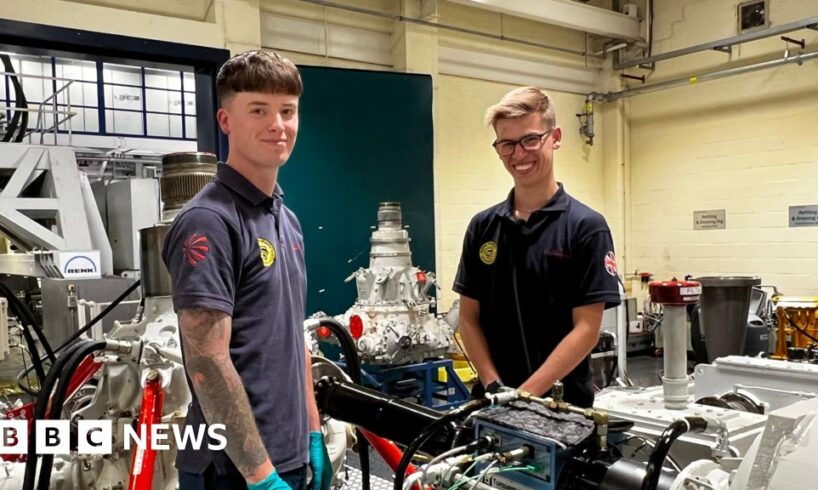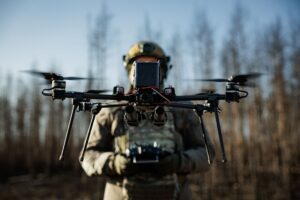
Dave Harvey
Business and Environment Correspondent, BBC West
BBC
Leonardo has hired 450 apprentices and graduates in the last year, many work at the helicopter factory in Yeovil, Somerset
Hundreds more jobs will come to firms supplying the armed forces as the government increases spending on defence, according to company bosses.
Emma Baker, policy chief at the defence industry group ADS, said they “are anticipating a lot more work” from government contracts.
More than 40,000 people work for companies in the defence sector in the South West, relying on Ministry of Defence (MoD) contracts for their business.
Many are gathering at the Royal International Air Tattoo (RIAT) in Gloucestershire, the biggest military air show in the world.
“We haven’t seen orders coming through yet,” said Seb Greene, Chief Executive of Bristol-based Broadway Group.
“We’re confident it is coming, but these things do take time to come through to us.”
The Royal International Air Tattoo is the largest military airshow in the world, attracting thousands of people, scores of defence firms, and dozens of fast jets.
One of the big draws at RIAT are the helicopters from Yeovil, often flying sideways.
At the famous Somerset helicopter factory, they listen carefully when the Prime Minister talks about increasing defence spending.
Over 3,000 people work at the historic plant, now run by Leonardo Helicopters.
And they are waiting for the final seal on a £1bn deal to supply the RAF with over 20 new helicopters. The contract will “create or secure over 3,000 jobs” in Yeovil, according to the company.
There are no other firms left bidding for the contract, but the deal is all now bound up in the government’s review of defence spending, and procurement.
Leonardo Helicopters
The AW 149 made in Yeovil is being offered to the Royal Air Force to replace the ageing Puma helicopters
Meanwhile, hundreds more young apprentices and graduate engineers are being recruited.
“I absolutely love it,” AJ McKenzie told me, beaming. “Wouldn’t change a thing about it.”
Born and bred in Yeovil, the 20-year-old signed up for an apprenticeship a year ago.
He now works on the team that maintain the gearboxes for the helicopters flown by the Royal Navy and RAF.
“Taking things apart, putting them back together, there’s a lot of ‘why does that not work?’, rather than just ‘it doesn’t work, put it in the bin’. It’s so satisfying.”
Chrissy Smith, a Principal Engineer at Leonardo, is “proud” to support the UK Armed Forces
Not all the work in this helicopter factory involves a spanner and engine grease. Hundreds work in sophisticated digital engineering, like Chrissy Smith. She has worked here for 36 year since joining as a technical assistant.
“Every day is different,” she said.
Today, she is demonstrating the ‘Digital Twin’, a high performance simulator which allows pilots to learn the controls in the safety and comfort of a building.
She is well aware that her team’s work is responsible for keeping aircrew alive in extreme situations.
“I’m proud to be part of something that will protect and secure the nation, that’s why I’m proud to work for Leonardo,” she explained.
For now, Chrissy, AJ and thousands of others can only wait while the Ministry of Defence considers the order for their new helicopter.
Defence industry leaders are confident that when it does come, the MoD review will mean more work.
“We are anticipating a lot more work,” said Emma Baker, from the trade body ADS.
“It is clear from the government that a lot needs to be done to increase industrial capacity.
“And it’s not just the UK. Across Europe, defence budgets are also rising.”
Josh Bakewell (l) is an apprentice at the Broadway Engineering Group in Bristol
Dozens of small firms are also waiting for the government to decide what it wants to buy more of.
On a small, nondescript trading estate in East Bristol, you could walk right by Broadway Group.
Step inside, and engineers are making high precision parts for jet engines. These too will be flown by RAF pilots, at supersonic speed. Extreme accuracy is standard.
Seb Greene, Broadway’s Chief Executive, said that defence contracts had kept the firm going through the pandemic.
“Commercial orders just fell off a cliff,” he explained. “Everyone stopped flying. But defence work carried on, crucially.”
The firm has grown from 80 staff to 180 on the back of military contracts, and now hires four apprentices each year, and a graduate too.
“Don’t pigeonhole yourself,” said Nanditha Gampala, a graduate recruit at Broadway Engineering
Nanditha Gampala studied for a Business Masters degree, and then landed a job at Broadway Group. She was keen to point out that jobs in the sector are not only for engineers.
“Aerospace has something for people with different backgrounds, different qualifications, there’s so much variety. So don’t pigeonhole yourself, there really is something for everyone here.”
If, when, the MoD finally publishes its shopping list of new kit for the expanded armed forces, many of the contracts will land in companies like this.
Across the South West of England, 130 firms work on military jobs, employing 44,000 people already. For now, they are waiting for Whitehall.
“These things do take time,” said Seb Greene, smiling ruefully. “But we are confident the contracts will come, and we will be able to invest in more technology and crucially, more people.”





